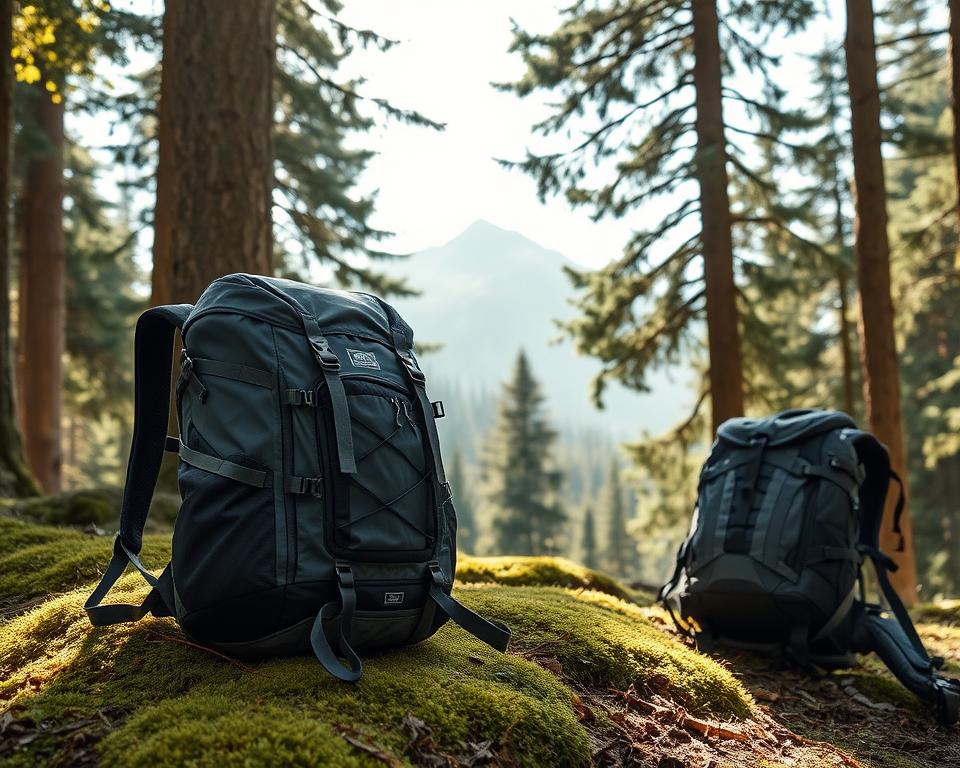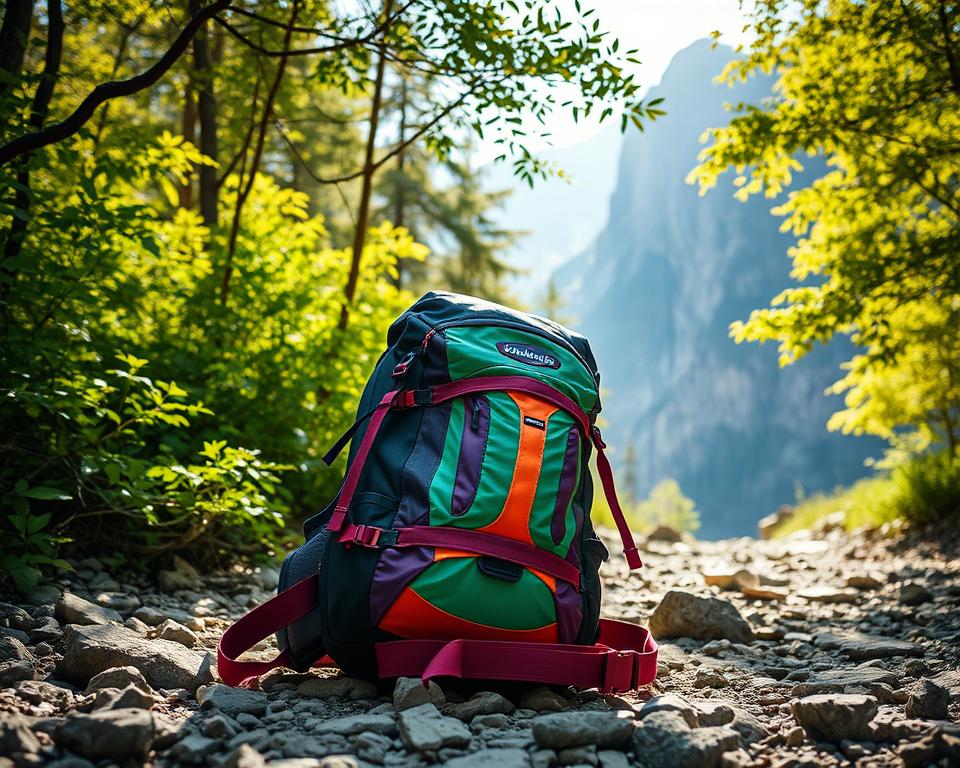Choosing the right gear for a hike is very important. It can affect your comfort and success on the trail. While all daypacks are technically backpacks, not all backpacks qualify as daypacks.
For lightweight hiking and day trips, daypacks are the best choice. They are small and light, with a design focused on simplicity. They can carry from 15L to 35L, perfect for water, snacks, and extra clothing. This makes them practical yet stylish for short hikes.
Backpacks, or rucksacks, are for heavier loads and longer trips. They come with bigger capacities and features for support. Backpacks are great for long adventures but also fit in the city. They are crucial for any outdoor journey.
Knowing the differences is key to choosing the right pack for your hike. It could be a short day hike or a longer multi-day adventure. Making the right choice will help meet your needs on the trail.
Understanding the Basics: What Defines a Daypack and a Backpack?
Knowing the differences between daypacks and backpacks helps you choose the right one for hiking. These differences focus on pack capacity, materials, and special design features. Each is made for certain hiking needs.
Differences in Size and Capacity
Daypacks and backpacks vary mainly in size. For short hikes, daypacks are ideal, ranging from 600 to 2,500 cubic inches. They let you carry just what you need. Backpacks are for longer trips, ranging from 25 to 85 liters. Some go up to 110 liters, great for long journeys.
Material and Build
The materials of daypacks affect their durability and weight. Daypacks use light materials like nylon or polyester, perfect for short hikes. Backpacks use tougher materials for rough use and bad weather. This shows how crucial the right material is for your needs.
Design and Functionality
Daypacks are simple and easy to carry, ideal for quick trips. They often have less padding. Backpacks, though, have straps and belts for weight distribution, good for longer hikes. They also have many pockets for easy access to stuff. These designs make hiking easier and more enjoyable.
When to Use a Hiking Daypack
Knowing when to use a hiking daypack instead of a big backpack can make your outdoor times better. If you’re going on a quick hike, doing day-to-day tasks, or looking for gear that fits many outdoor activities, understanding when to use a daypack is key. It helps you get the best out of your daypack.
Ideal Scenarios and Activities
Hiking daypacks are great for activities that don’t need a lot of gear. If you’re heading out for a short hike, packing light can make it more fun. These packs can carry essentials like snacks, water, and a jacket, with sizes from 15L to 35L.
Daypacks are awesome for city life too. They’re small, easy to carry, and great for things like going to work or a coffee shop visit link. Switching from outdoor adventures to city life is easy with them. Their design lets you quickly get what you need from the pack.

The Cost-Effectiveness of Daypacks
Hiking daypacks are also great because they’re affordable. This is important for people who love the outdoors but watch their spending. Most start around $40, which is easy on the wallet. Yet, they still offer good quality and usefulness.
Choosing a daypack means you can travel light and avoid body strain, but still be ready for adventure. They’re perfect for short trips, not the long ones needing big backpacks. For shorter trips, a daypack is just right and saves you money.
When to Opt for a Backpack
When heading out for long hikes or multi-day adventures, a full-sized backpack is key. It must hold all camping gear, food, and personal items in a way that’s comfy to carry. Let’s look at when a sturdy hiking backpack is really needed.
Long-Duration Hikes
For trips that last several days, you need a backpack that supports you well. It should carry 15-20lbs easily thanks to internal frames. These frames help spread the weight evenly across your back.
Such backpacks come with many pockets for your camping gear. They keep things organized and reachable. They have features like load lifters and adjustable straps. These make the backpack comfortable to wear, so you can walk farther without getting tired.
Multi-Day Camping Trip Essentials
Choosing the right backpack size is crucial for multi-day camps. You’ll need 40-60 liters to fit tents, sleeping bags, cookware, and clothes. Hip belts are a must; they take on 80% of the pack’s weight. This helps ease the burden on your shoulders.
Brands like Osprey design backpacks for these specific needs. They offer features such as bungee systems, loops for ice axes, compression straps, and hydration pockets. This makes packing easier and helps manage the load better.
A good backpack can transform your hiking experience. It lets you trek further with less effort. Always try the backpack with a full load at home. This ensures it fits well and is comfy for your journey.
What are the Best Practices for Packing a Daypack for Hiking?
When packing a hiking backpack, prioritize weight distribution and accessibility. Place heavier items close to your back, while lighter gear should be on top or at the sides. Organize essentials like water, snacks, and first aid in easily reachable pockets, ensuring a smooth, enjoyable hiking experience.
Key Features to Look For in Hiking Daypacks vs. Backpacks
Choosing between a hiking daypack and a backpack can be tough. You have to look at comfort, storage, and if it can last a long time. Knowing these things helps make your hike better and keeps your stuff safe from the weather.
Comfort and Support
Being comfortable is key, whether you’re going for a short or long hike. You should pick daypacks that feel good on your shoulders and back. They should have padded straps, sternum bands, and fit well. Backpacks for longer trips need hip belts and straps to keep the load steady.
To find the perfect pack, measure your torso and adjust the straps. A pack that fits well makes a big difference in how comfortable you feel.
Storage and Accessibility
Having enough space and getting to your things easily matter a lot in outdoor gear. Daypacks that hold 10 to 30 liters are great for small important items. They should have places to put your water bottle and belts for carrying ease. Larger backpacks, from 40 to 65 liters, need more compartments and pockets.
They should come with hydration sleeves and pockets for snacks and maps. For more tips on storage, check this rucksack guide.
Durability and Weather Resistance
Want hiking gear that lasts? Check the material’s strength and type before buying. Higher denier ratings mean tougher material, which is good for rough paths. Packs should also keep your stuff dry in rain or different weather. Materials like nylon and strong woven fabrics are best for these conditions. With the right materials, your gear will last longer and keep you comfortable on any hike.

